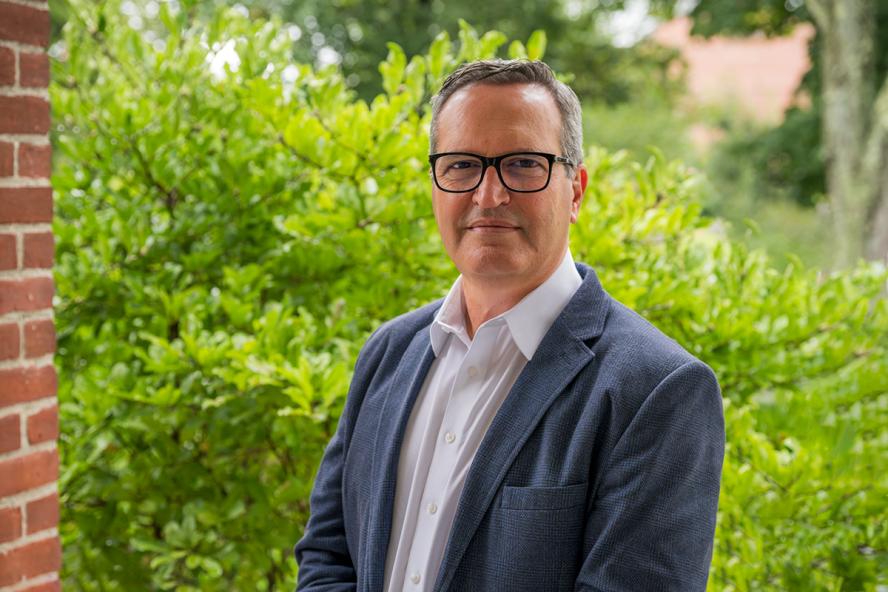-
About
- Leadership & Faculty
- News & Events
-
Academics
- Graduate
- Advanced Clinical Training
- Continuing Education
- Academic Departments
- Academic Offices
- Simulation Experiences
-
Student Life
- Offices
-
Research
-
Hospitals & Clinics
- Emergency Care
- Hospital Services
-
Community Outreach
- Volunteer
Welcome aboard: Dr. Carlos Pinto
Internationally recognized researcher appointed department chair of Ambulatory Medicine and Theriogenology

Dr. Carlos Pinto (he/his), internationally recognized for his theriogenology research (an animal reproduction veterinary medicine specialty), was appointed in August as the Dorrance H. Hamilton Professor in Applied Reproductive Medicine and chair of the Department of Ambulatory Medicine and Theriogenology at Cummings School of Veterinary Medicine.
Born in São Paulo city, Pinto grew up in Brazil and earned his veterinary degree from São Paulo State University. Following nearly a decade working in his own mixed-animal practice, he completed a residency in comparative theriogenology at Louisiana State University (LSU), where he became board-certified by the American College of Theriogenologists and earned a Ph.D. during a clinical fellowship, also at LSU.
“As a vet student I became interested in reproduction and followed my dream to complete a residency and become a specialist,” he shares.
Drawn to pursuing a career in academia after completing his clinical specialty training and Ph.D. program, Pinto worked as a theriogenology faculty member at North Carolina State University, The Ohio State University, and LSU for a total of 22 years while conducting research and serving as a clinician. Through his research with horses, cattle, and small animals, he has published 52 peer-reviewed articles, 86 abstracts, and 74 book chapters, with an emphasis on pharmacologic control of reproduction and comparative assisted reproduction.
Dr. Pinto is no stranger to Cummings School, as he first assisted with its Equine Enrichment Week in 2008 through an invitation from a colleague, and then returned to assist with the elective course a few times over the past decade. When he learned the School was searching for a chair for its newly created Department of Ambulatory Medicine and Theriogenology, Pinto contacted his theriogenologist colleague, Dr. David Matsas. A former associate professor and previous interim chair of the School’s Department of Environmental and Population Health, Matsas encouraged Pinto to apply for the position which he now holds.
I think this may be the only department in the U.S. which has theriogenology in its name,” Pinto contends. “That caught my attention.
Pinto is excited to work with a talented group of department faculty to implement the new curriculum, which will begin next academic year. “I look forward to seeing our department participate in the new curriculum and to continue to advance our academic programs. We are also planning to expand our physical resources in Woodstock [Connecticut], (where Tufts Veterinary Field Service operates) to accommodate a growing number of staff and faculty.”
He is eager to continue his research as the Dorrance H. Hamilton Professor of Applied Reproductive Medicine. “We plan to establish an assisted reproduction lab on the Grafton campus, which I look forward to setting up and fulfilling the goals established for this professorship, including the training of veterinary and graduate students,” he shares.
Personally, Pinto enjoys working with horses, although he’s not a rider. “I leave that to my wife, Chelsey, who is an amateur show jumper with Veritas, our Holsteiner mare. They both have fun participating in show-jumping competitions around the country,” he says. The couple owns a 7-year-old Dutch shepherd named Rye and in his spare time, Pinto also likes to play soccer. “I’ve played in a couple of the community soccer games on Sundays at the Grafton campus where I’ve met many students, as well as staff and faculty. It’s been fun and I look forward to continuing to play this fall.”
Department:
Dept. of Large Animal Clinical Sciences